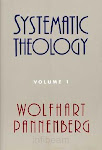This is an essay on the nature of doctrine. References are to Jaroslav Pelikan’s monographs on the development of Christian doctrine. Reference (3:241) would refer to volume 3, page 241.
1. Doctrine is “important”
2. Doctrine and mystery
3. The inadequacy of doctrine
4. The inevitability of doctrine
5. The scope of doctrine
6. “Hierarchies” of doctrine
7. The relation of words and reality
8. Liturgy as the fulfillment of doctrine
9. Love as the fulfillment of doctrine
-- -- --
The Inadequacy of Doctrine
Doctrine relates to mystery; and mystery relates to the transcendental, what is above human reason.
Scripture, true to this fact, “spoke in a way that was not literally accurate, in order to enable its readers to grasp what transcended literal accuracy” (2:14), and “differed from later systematic theologies by refusing to [quoting Bushmill] ‘make up any formula of three or four lines’ that would attempt to encapsulate”, for example, the person and work of Christ (5:266).
“The knowledge of God was a knowledge of the unknown and the unknowable, in continuity with the witness of Scripture and the teachings of the fathers” (2:36). For Grundtvig dogmatic tradition was “not a part of the divine word separately from that which is written, but the content of Scripture itself as apprehended … by the church” (5:254).
The God to whom doctrines referred transcended philosophical categories, too.
According to Jacob of Edessa, even the terms used by the fathers and the councils – such as hypostasis and ousia – were inadequate (2:54).
In fact, all language was inadequate, biblical or philosophical or what not.
“Abstract or ‘spiritual’ language about God was not less figurative and ‘symbolic’, and hence no more literal or accurate, than concrete and physical metaphors were,” as Nicholas of Cusa recognized with special clarity (4:67). Each of the doctrines “pointed beyond itself to something that seriously qualified it”, and true “theological mystagogy” transcended dogma (2:30).
Scripture itself admonishes us: “Seek not what is too difficult for you, nor investigate what is beyond your power. Reflect upon what has been assigned to you, for you do not need what is hidden.” (Ecclus. 3:21-22).
This admonition of Sirach “not to seek what is too difficult for you” was embedded in the tradition of medieval thought (3:99). How is this possible considering that the high middle ages are considered the hay-day of speculative theology?
Upon closer look the admonition, in fact, allows a certain “investigation”. Erigena and Maximus, his spiritual master, both took it not only as an allowance but as a command to investigate (3:99). For investigation itself is, surely, the only way to know what is “too difficult” and “beyond our power” or “hidden” on the one hand, and what is “assigned to us” on the other.
Paradoxically, only by investigation can we find and set the limits of investigation.
Erigena, even as a “mystical theologian”, warns us that a conception, say, of transcendence beyond all existence, can make the name “God” meaningless (3:102). So-called negative theology which stressed the unknowability of God “refused to pry into the mysteries of the divine being”, admittedly, but it produced “a concentration on that which could be known” (2:259). It was the goal of Gregory of Palamas to protect both the unknowability and knowability of God (2:269). (Here we could ask, do dogmas pertain to what is “known” or “unknown” in God, but this is probably a false question.)
True theology is simultaneously both “negative” and “sublime” (2:32). Theology or doctrine is inadequate; but it is also inevitable.
2 years ago







No comments:
Post a Comment